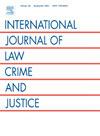波兰对强迫婚姻的刑事定罪:对当前法律变化背后原因的批判性分析
IF 1.4
4区 社会学
Q3 CRIMINOLOGY & PENOLOGY
International Journal of Law Crime and Justice
Pub Date : 2025-08-31
DOI:10.1016/j.ijlcj.2025.100774
引用次数: 0
摘要
2023年,波兰法律设立了一项新的罪行:强迫某人与某人结婚。这些规定与引诱某人离开波兰意图强迫他们结婚的行为结合并加以补充。这项立法相当出人意料,因为当时政府和议会多数是由另类右翼政党组成的,这些政党积极反对妇女权利和移民的涌入,特别是来自政治家所说的“文化遥远国家”的移民。在本文中,我介绍了新通过的立法,并在两个案例研究的背景下分析了其原因:波兰罗姆社区和波兰车臣社区。后者的基础是实地工作,包括采访在波兰遭受各种形式家庭暴力的难民妇女,以及与这一群体合作的专家。这些基于性别的暴力形式包括强迫婚姻,主要是早婚。本文旨在评估这项新法规是否有可能改善对潜在受害者的保护,特别是对波兰具有移民背景的妇女的保护,更广泛地说,当施虐者是家庭成员时,刑法是否是对社会问题的适当反应和保护潜在受害者的最佳工具。本文章由计算机程序翻译,如有差异,请以英文原文为准。
Criminalisation of forced marriages in Poland: the critical analyses of the reasons behind this current legal change
In 2023, Polish law saw the establishment of a new crime: forcing a person to marry someone. These provisions were combined with and supplemented by the criminalisation of luring a person to leave Poland with the intention of forcing them into marriage. This legislation was rather unexpected, considering that at the time, the government and the parliamentary majority were composed of alt-right political parties that were actively opposing both women's rights and the influx of immigrants, especially from what politicians referred to as “culturally distant countries”.
In this paper, I present the newly adopted legislation and analyse its reasons against the backdrop of two case studies: the Polish Roma community and the Chechen community in Poland. The latter is based on fieldwork involving interviews with refugee women who experienced various forms of domestic violence while in Poland, as well as experts working with this group. These forms of gender-based violence included forced marriages, mostly in the form of early marriages. The paper aims to assess whether this new regulation has the potential to improve the protection of potential victims, especially women with migration backgrounds in Poland and, more broadly, whether criminal law is the appropriate response to social problems and the best tool to protect potential victims when abusers are family members.
求助全文
通过发布文献求助,成功后即可免费获取论文全文。
去求助
来源期刊
CiteScore
2.70
自引率
0.00%
发文量
25
审稿时长
47 days
期刊介绍:
The International Journal of Law, Crime and Justice is an international and fully peer reviewed journal which welcomes high quality, theoretically informed papers on a wide range of fields linked to criminological research and analysis. It invites submissions relating to: Studies of crime and interpretations of forms and dimensions of criminality; Analyses of criminological debates and contested theoretical frameworks of criminological analysis; Research and analysis of criminal justice and penal policy and practices; Research and analysis of policing policies and policing forms and practices. We particularly welcome submissions relating to more recent and emerging areas of criminological enquiry including cyber-enabled crime, fraud-related crime, terrorism and hate crime.

 求助内容:
求助内容: 应助结果提醒方式:
应助结果提醒方式:


